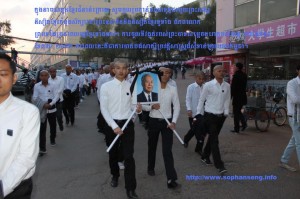For sincere condolence, love and shared responsibility of Cambodian nation: special collection of news outlets regarding Somdech Ta King Norodom Sihanouk
Cambodia’s Mercurial Former King, Norodom Sihanouk, Dies at 89
.jpg) |
| Cambodia’s former King Norodom Sihanouk greets his subjects at the annual crop-planting ceremony outside the royal palace in Phnom Penh on April 30, 2002 (Chor Sokunthea / Files / Reuters) |
 |
| Cambodia’s former King Norodom Sihanouk, pictured in July 1941 (AP) |
The former monarch, who died Monday in Beijing at 89, was at various times a playboy prince, a teenage King, an independence leader, an elected Prime Minister, an exile and, later, a peace negotiator
By Kay Johnson | October 15, 2012
Time Magazine (USA)
In the end, he couldn’t script a happy ending for Cambodia.
Filmmaking was a favorite hobby of Cambodia’s former King Norodom Sihanouk, and in his long, extraordinary life, he played enough roles to fill a Hollywood epic. The former monarch, who died Monday in Beijing at 89, was at various times a playboy prince, a teenage King, an independence leader, an elected Prime Minister, an exile and, later, a peace negotiator. Along the way, he found time to compose jazz tunes, throw champagne-soaked soirées and rub shoulders with the likes of Jawaharlal Nehru, Charles de Gaulle, Mao Zedong, Jacqueline Kennedy, Sukarno and Kim Il Sung. The part he loved to play most, though, was that of Samdech Euv, or Papa King, to the Cambodian people, known as the Khmer. “My people love and admire me and respect me so very much,” he once said. “They continue to believe I am a god-king.”
Though he cast himself as heroic, Sihanouk, like the country he once led and long symbolized, was most defined by tragedy. His carefully cultivated status as a benevolent and glamorous ruler wasmarred by his cooperation with the murderous Khmer Rouge, whose “killing fields” regime of the 1970s left 1.7 million dead. It was a decision that cost him dearly: he himself was held prisoner by the Khmer Rouge, who killed five of his 14 children. His passing is a reminder of a long-past era when Southeast Asia, not Afghanistan and Pakistan, was the focus of a protracted U.S. war. During the Vietnam War, Cambodia was carpet bombed by the Nixon Administration trying to root out “safe havens” across the border, an eerie precursor to today’s drone campaign in northwestern Pakistan.
The mercurial Sihanouk was a man of contradictions — an avowed Cambodian patriot who wrote mostly in French, a man who sought peace for his people, but whose decisions seemed to lead them, time and again, to disaster. “Sihanouk was certainly one of the most interesting leaders of the 20th century,” said Milton Osborne, author of the critical biography Sihanouk: Prince of Light, Prince of Darkness. “But I wouldn’t say he was one of the best leaders.”

